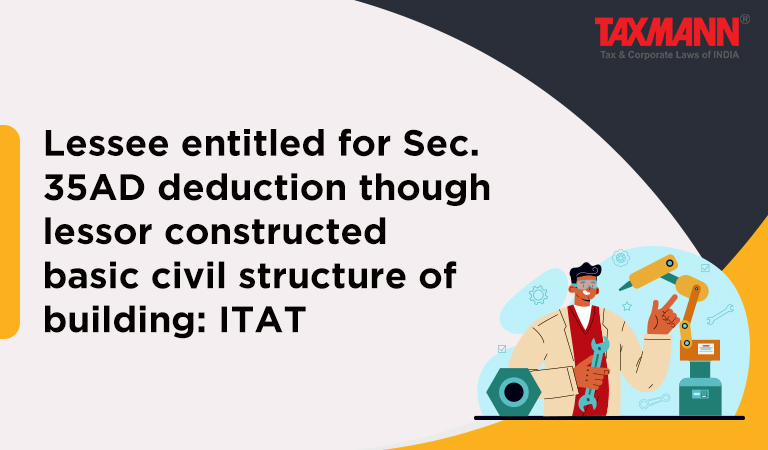Lessee entitled for Sec. 35AD deduction though lessor constructed basic civil structure of building: ITAT
- Blog|News|Income Tax|
- 2 Min Read
- By Taxmann
- |
- Last Updated on 22 February, 2022

Case Details: Taj GVK Hotels & Resorts Ltd. v. ACIT - [2022] 135 taxmann.com 81 (Hyderabad - Trib.)
Judiciary and Counsel Details
-
- A. Mohan Alankamony, Accountant Member and S.S. Godara, Judicial Member
- V. Siva Kumar for the Appellant.
- Ashok Kardam, DR for the Respondent.
Facts of the Case
The assessee engaged was in the business of running hotels and resorts. It filed its return of income wherein it claimed deduction under section 35AD. The deduction was claimed on the ground that it had incurred expenditure towards the construction of a new Five Star Hotel.
During scrutiny assessment, the Assessing Officer (AO) disallowed the claim of deduction under section 35AD. AO contended that the assessee did not build the hotel building and operated the same on the leasehold land & building.
The CIT(A) upheld the order of AO. Aggrieved-assessee filed the instant appeal before the Tribunal.
ITAT Held
The Tribunal held that section 35AD does not specify that the assessee has to construct the entire building by itself or own the building and land. The provisions only specify that the specified business should be in the nature of the building and operating a new hotel of 2 stars or above category as classified by the Central Government.
In the assessee’s case, there is no doubt that the entire investment made by the assessee was for constructing a portion of the building and for operating a new hotel of the category specified under the Act. Further, from the provisions of section 35AD, it was evident that these provisions are brought into the Act to promote certain specified businesses in the country.
These provisions grant deduction to the assessee regarding the entire capital expenditure incurred wholly and exclusively for the specified business that has commenced during the previous year. Even otherwise, by virtue of section 32, the assessee is entitled to deduction towards such expenditures under section 32 by way of depreciation over time.
Therefore, there is no loss to the revenue when the whole issue is viewed in its entirety because when the assessee derives the benefit of section 35AD, it saves payment of tax in the initial years but in the subsequent years ends up paying higher tax as it is deprived of the benefit of depreciation under section 32.
Provisions of section 35AD only help the assessee to maintain higher cash liquidity during the initial years of its business. Once deduction under section 35AD is claimed, then by virtue of section 35AD(4), no other deduction in respect of these expenditures shall be allowed as deduction.
Thus, keeping in view of the facts and circumstances of the case, the assessee was entitled to the benefit of deduction under section 35AD.
List of Cases Referred to
-
- Nagulapati Lakshmamma v. Mupparaju Subbaiah [1998] 5 SCC 285 (para 8.1)
- Jugal Kishore Saraf v. Raw Cotton Co. Ltd. AIR 1955 SC 376 (para 8.1)
- Commissioner of Sales Tax v. Industrial Coal Enterprises [1999] 114 STC 365 (SC) (para 9).
Disclaimer: The content/information published on the website is only for general information of the user and shall not be construed as legal advice. While the Taxmann has exercised reasonable efforts to ensure the veracity of information/content published, Taxmann shall be under no liability in any manner whatsoever for incorrect information, if any.

Taxmann Publications has a dedicated in-house Research & Editorial Team. This team consists of a team of Chartered Accountants, Company Secretaries, and Lawyers. This team works under the guidance and supervision of editor-in-chief Mr Rakesh Bhargava.
The Research and Editorial Team is responsible for developing reliable and accurate content for the readers. The team follows the six-sigma approach to achieve the benchmark of zero error in its publications and research platforms. The team ensures that the following publication guidelines are thoroughly followed while developing the content:
- The statutory material is obtained only from the authorized and reliable sources
- All the latest developments in the judicial and legislative fields are covered
- Prepare the analytical write-ups on current, controversial, and important issues to help the readers to understand the concept and its implications
- Every content published by Taxmann is complete, accurate and lucid
- All evidence-based statements are supported with proper reference to Section, Circular No., Notification No. or citations
- The golden rules of grammar, style and consistency are thoroughly followed
- Font and size that’s easy to read and remain consistent across all imprint and digital publications are applied



 CA | CS | CMA
CA | CS | CMA
